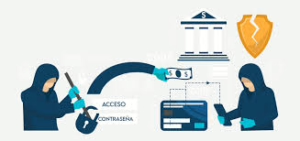Patrick, who is not using his real name, considers himself quite tech-savvy and believes he can easily avoid scams.
This was one of the initial points he wanted to emphasise as he recounted his personal experience to me.
Having encountered anti-scam warnings in the past and being aware of news stories about individuals losing their hard-earned money to fraudsters, Patrick felt confident that, at just 21 years old, he would never fall victim to a scam.

“There was a genuine person behind this,” he said, his voice tinged with a trace of unresolved hurt as he shared his story.
The ordeal began one ordinary afternoon when he received a message on Telegram.
“I’ve seen plenty of messages like this from unknown numbers before. Definitely a scam, right?”
So, following the advice of many informed individuals, Patrick dismissed the message and continued with his day.
He might have forgotten all about it if the same sender hadn’t reached out again a few days later.

It was this second message that piqued Patrick’s interest enough to respond.
“That’s what caught my attention. [I realised] there was a real person behind this,” he explained.
“Alright, let’s engage with the scammer and see what’s going on.”
“I thought I was clever enough to avoid [any scams].”
Driven by curiosity, Patrick initiated a dialogue with the scammer.
The Telegram user, Alice (not her real name), wasted no time with pleasantries and immediately introduced him to a “money-making program.”
“They claimed it was an incentive program. All you had to do was press a button, and that was it.”
Curious about the inner workings of the operation and its funding sources, Patrick sought to learn more.
“I believed I was clever enough to avoid any scams. I can exit at any time.”
As their discussion progressed, Patrick found himself added to a WhatsApp group consisting of approximately 16 members.
The group was already buzzing with conversation—messages expressing gratitude for the program, congratulatory notes on profits made, and shared screenshots of successful withdrawals from the platform, among other exchanges.
“I still can’t believe it,” Patrick shared. “I even did a Google search to see if the company was legitimate.”

He discovered the organisation’s website, which was filled with stock photos and cliched language, yet it provided sufficient assurance for him that an actual entity was behind the program.
A ‘straightforward’ program
With his scepticism waning, Patrick received a link to a site where he needed to create an account by entering his details, including his name and email address.
There was no requirement to connect his bank account to the site.
The program functioned quite simply:
Participants were instructed to fund their accounts by sending money to a PayNow number listed on the website.

After the transfer, the funds would appear in their account, allowing them to engage in the program.
On the program’s website, there was a spinning wheel filled with movie titles currently playing in theatres.
A participant must spin a wheel that will eventually stop on a movie title.
Subsequently, a pop-up will prompt the participant to purchase several movie tickets for the selected film.
The funds used for these ticket purchases will be subtracted from the balance in their account.
Additionally, the participant will receive a commission for buying these tickets. Although Patrick couldn’t recall the exact profit margin, he remembered it was significant enough to attract him, especially since he was in need of money at that point.
He achieved a 150 per cent profit.
Cautiously, Patrick deposited S$10 into his account on the platform.
He then bought his initial movie tickets and successfully increased his account balance to S$25, which indicated a 150 per cent profit.
Continuing to explore this opportunity, Patrick managed to withdraw the funds back to his bank account.
This led him to believe that the program was legitimate.
Withdrawals were permitted only after every 20 spins, but after experiencing his first profit, Patrick felt he had little to lose and much to gain.

“I was desperate,” he shared with me.
At that time, Patrick was fulfilling his National Service obligations and was facing financial difficulties.
“I was uncertain about my future,” he admitted. “I felt scared and panicked.”
“If this turns out well, then great. What’s the worst that could happen?” he wondered.
“I could withdraw the funds. There was a possibility of getting money back. It seemed relatively safe.”
Too invested to walk away
Thus, Patrick transferred S$100 into his account.
He continued playing several rounds, maintaining the same approach—using the funds in his account to buy movie tickets while replenishing his balance by sending money to a PayNow number, which, interestingly, changed with each round.
The amount required for purchasing tickets increased with every spin, compelling him to add more money to his account to keep participating in the game.
Yet, Patrick didn’t question the situation.
To reach round 20, Patrick borrowed around S$4,000 from his friends, ultimately making it to the 18th round. However, the stakes for the following two rounds were enough to pull him out of the seemingly endless cycle of the program.
“The next round required S$9,000, and the final one was S$10,000. That’s beyond my means. I genuinely can’t manage that.”

“At that time, I had already lost approximately S$7,000. For someone in national service, that’s a significant amount.”
When I inquired about his emotions during that period, Patrick admitted he “didn’t want to accept that it was a scam.”
“I just wanted to think I had lost a bit of money, nothing more.”
However, a few days later, the WhatsApp group he had joined was gone, and he discovered that he couldn’t access the website where he had deposited his funds.
That was the moment he realised he had been deceived.
“I felt worse than hopeless,” he expressed. “But I could only blame myself.”
Seeking “to find solutions, whatever I can.”
Patrick promptly reported the incident to the police.

The authorities did their best to assist him by gathering information regarding the case and obtaining receipts for his transactions.
“I made it clear that I didn’t expect to get my money back,” Patrick shared.
Having read numerous articles and stories, he understood that recovering the lost money was akin to searching for a needle in a haystack.
Yet amid the uncertainty, Patrick’s priority was simply “to find solutions, whatever I can.”
Reporting the scam provided him with some relief as he felt he “had done everything possible.”
Enduring consequences
The entire episode, from responding to Alice’s message to losing his funds on the website, unfolded in under eight hours.
Nevertheless, the repercussions lingered in his life for the subsequent three to four years.
For over three years, he had to repay his friends in instalments and often skipped lunch, subsisting primarily on rice with egg tofu.
He chose not to confide in his friends about what had transpired, feeling “embarrassed.”

He chose not to share his experience with his friends because he felt “ashamed” about being duped by a scam.
Patrick revealed that it was only in the previous year that things started to settle down for him.
However, he still bears some emotional scars—he admitted that his heart would race whenever he received a message or call from an unknown number.
Now, he has stopped engaging with such texts or calls and reports and blocked those numbers.
“Do not engage with them.”
At 25, reflecting on his past remains a challenge for Patrick.
“That’s the toughest part. Growing up online, you find yourself falling for the most absurd scams.”
With the rise of anti-scam initiatives, Patrick feels hopeful that people will learn to protect themselves against fraud.

Still, he recognises that scammers are becoming more sophisticated, and their schemes are increasingly complex.
Stay alert
Maintaining awareness is crucial to steer clear of scams.
Legitimate jobs will never ask you to pay money upfront, use your personal bank account for transactions, or share your Singpass credentials.
Being adept at navigating the digital world isn’t sufficient; we all have blind spots, and scams continuously evolve.
Keep in mind the acronym ACT (Add, Check, Tell) to strengthen our defences against scams.
1. INSTALL the ScamShield app
Download the ScamShield App to safeguard yourself from fraudulent calls and messages. Additionally, improve the privacy settings on your messaging applications to prevent being added to unfamiliar group chats, and activate Two-Factor Authentication (2FA) and multifactor Authentication for your banking and e-wallet services.
2. VERIFY for any signs of scams
Verify the legitimacy of job offers by contacting the company directly and consulting someone you trust about the opportunity. If you’re uncertain, call the 24/7 ScamShield Helpline at 1799 for assistance.

3. INFORM authorities, family, and friends about scams
If you believe you have fallen victim to a scam, contact your bank and file a police report.
Report and block any suspected scam accounts or chat groups. Moreover, alert your friends and family about this scam experience.
As Patrick advised, “Do not engage. Don’t entertain them. Just block and report immediately.”

Maxthon
In today’s rapidly evolving digital world, ensuring personal safety while navigating the expansive internet has become crucial. The complex network of online connections demands careful consideration in browser choice, with an emphasis on security and privacy. Among the many available options, Maxthon emerges as a reliable choice that effectively addresses these vital issues without charging users. This sophisticated browser comes packed with a range of built-in features, including a robust ad blocker and various anti-tracking tools, all essential for enhancing your online privacy.

Maxthon Browser Compatibility with Windows 11
Maxthon has established itself in the competitive web browser arena by prioritising user safety and confidentiality. It is dedicated to protecting personal information and online activities from various digital threats, employing a range of practical strategies to ensure user data remains safe. By utilising advanced encryption technologies, Maxthon ensures that sensitive information stays secure and private throughout all online activities.
When it comes to safeguarding your privacy while browsing, Maxthon truly excels. Every element of this browser has been carefully crafted to enhance user privacy. Its strong ad-blocking features, extensive anti-tracking tools, and specialised incognito mode work together seamlessly to eliminate disruptive ads and reduce tracking scripts that could interfere with your browsing experience. As a result, users can navigate the web with greater confidence and security. The incognito mode provides an additional layer of protection, enabling users to explore the internet with even more peace of mind.
